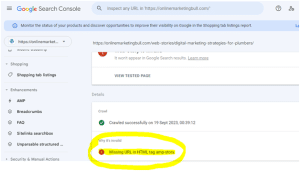Leveraging AI Powerhouses: A Deep Dive into the Top 10 AI Tools in Digital Marketing
Introduction
Personalised experiences, effective methods, and data-driven decisions now rule the complex ecology that is digital marketing. Artificial intelligence (AI), which has transformed how marketers interact with their audiences and achieve unmatched outcomes, is at the centre of this transition.
The top 10 AI tools that are changing the face of digital marketing are examined in this article. A complete reference for marketers looking to leverage the power of AI is provided by the names of each AI tool and their website name.
1) Chatbots and Virtual Assistants
Tool: Chatfuel
Website: www.chatfuel.com
Chatbots and virtual assistants are pivotal in providing seamless customer interactions and engagement. Chatfuel empowers businesses to create AI-powered chatbots for various platforms, enhancing customer support, lead generation, and user engagement.
2) Personalization Engines
Tool: Dynamic Yield
Website: www.dynamicyield.com
AI-driven personalization engines like Dynamic Yield analyze user behavior to deliver tailored content and product recommendations. This enables marketers to create hyper-personalized campaigns, enhancing customer experiences and boosting conversion rates.
3) Text to Speech with a Versatile AI voice generator
Tool: Murf.Ai
Website: Murf.Ai
AI enabled, real people’s voices. Make studio-quality voice overs in minutes. Use Murf’s lifelike AI voices for podcasts, videos, and all your professional presentations
Watch YouTube Vidoe Of Murf.Ai
How to Convert Text to audio using Murf Ai Software | Create Voice Overs With Murf Ai
4) Content Generation Tools
Tool: Writesonic
Website: www.writesonic.com
AI-driven content generation tools like Writesonic automate the creation of various content types, from blog posts to marketing copy. Marketers can save time while maintaining a consistent output of high-quality, data-driven content.
5) Social Media Analysis
Tool: Sprout Social
Website: www.sproutsocial.com
Sprout Social utilizes AI to provide in-depth social media analysis, enabling marketers to monitor conversations, track brand mentions, and measure sentiment across different platforms. These insights facilitate better understanding of the target audience and informed strategy adjustments.
6) Programmatic Advertising
Tool: Google Display & Video 360
Website: displayvideo.google.com
For programmatic advertising, Google Display & Video 360 employs AI algorithms to automate the buying and placement of digital ads. Real-time data analysis ensures ads reach the right audience at the right time, increasing engagement and conversions.
7) Email Marketing Optimization
Tool: Phrasee
Website: www.phrasee.co
AI-powered email marketing tools like Phrasee optimize subject lines, content, and send times for maximum impact. By analyzing user behavior, these tools personalize email content, leading to higher open and click-through rates.
8) SEO and Content Optimization
Tool: MarketMuse
Website: www.marketmuse.com
MarketMuse utilizes AI to optimize SEO and content strategies. By analyzing search trends and competitor data, it provides recommendations to improve search engine rankings and align content with user intent.
9) Voice Search Optimization
Tool: PULSE by Pindrop
Website: www.pindrop.com/pulse
PULSE by Pindrop focuses on voice search optimization. As voice queries become more prevalent, this tool helps marketers tailor content to conversational search patterns, enhancing visibility in voice search results.
10) Marketing Automation Platforms
Tool: HubSpot
Website: www.hubspot.com
HubSpot offers an integrated marketing automation platform that combines AI tools to streamline various marketing processes. From lead nurturing to campaign tracking, HubSpot empowers marketers to manage tasks efficiently while focusing on creativity and strategy.
Conclusion
A change in how companies communicate with their audience has resulted from the combination of AI and digital marketing. The AI tools mentioned in this article, along with websites names, provide marketers with a road map for navigating this challenging environment. Adopting these tools may give marketers the ability to personalise experiences, optimise campaigns, and achieve previously unheard-of levels of efficacy and efficiency as AI develops. In an increasingly data-driven environment, marketing will take on new forms thanks to the symbiotic interaction between AI and digital marketing.




